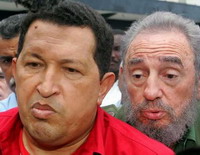Hugo Chavez' reforms may pose risk to private property
The pending constitutional revisions may pose risk to private property and increase seizures of buildings, lands and businesses.

If approved in a referendum Dec. 2, the reforms would enshrine socialist ideology in Venezuela's constitution and create a new class of collective property to be managed by communities and worker cooperatives.
Hugo Chavez said in a speech Thursday night that Venezuelans should not be afraid of the changes.
"How can someone believe that we're going to eliminate private property, personal property, if what we're doing is multiplying it?" he said, accusing opponents of spreading disinformation.
"They've spread fear like never before," Chavez told supporters. "Our campaign has to be more intense - them sowing fear and us erasing it."
Yet his opponents say their worries are justified, because of Chavez's record and what is written in the proposed reforms, which say the state will place "common interests above the individual."
"It seems the government intends to make private business progressively disappear," said Nelson Maldonado, president of Consecomercio, one of Venezuela's main business chambers. "There is no democracy without private property, without free initiative - much less if there is no clear, reliable, and permanent respect for the right to property."
Under Chavez, the government has expropriated apartments for public housing, as well as businesses from a sugar refining plant to a paper plant. Chavez also has used soaring oil revenues to fund nationalization, buying shares of electric utilities and a telecommunications company.
The government has transferred more than 1 million hectares (2.5 million acres) of farmland to poor farmers, saying it was underused or that owners did not have adequate titles.
Many of the have-nots applaud these changes. Amid a decades-old housing shortage, squatters regularly seize unoccupied land and buildings.
"It can't be that there are houses empty when there are so many people without a roof over their heads, living in shacks," said Ana Inojoso, 29, a street vendor who rents a bare brick "rancho" in a Caracas slum. She supports Chavez's reforms, which also would eliminate presidential term limits.
While Caracas' streets have filled with campaign rallies, poor slumdwellers have been building shacks in a new squatter settlement next to the capital's horse racetrack, escaping crowded shantytowns where more than two families are often crammed into a single home.
On the plywood of her new shack, one woman painted the word "Yes!" to show support for Chavez.
In affluent areas, some concerned homeowners are trying to sell, particularly those with second homes who fear future legal changes.
Julio Rivas, 55, a Spaniard who has lived in Caracas for years, plans to sell his two homes and move back to Spain soon. "The guarantees taken for granted in any normal country have totally disappeared," he said.
Home sales rose 20 percent in Caracas last year, and are to increase an additional 17 percent in 2007, according to the Venezuelan Real Estate Chamber.
Other homes remain on the market, finding few buyers, as real estate analysts say increasing numbers of wealthy Venezuelans now prefer to buy in places like Panama or Florida.
Another of the reforms would allow the state to provisionally occupy property for expropriation "during the legal process" - before a court has ruled. Critics say that would recognize the government's current practices.
When Chavez refused to renew the license of opposition-sided television station RCTV six months ago, the Supreme Court ordered the temporary seizure of its broadcasting equipment, including transmitters, to be used by a new public channel.
The equipment is worth US$140 million (94 million EUR), but RCTV has yet to receive any compensation, said Oswaldo Quintana, RCTV's vice president of legal affairs. "That's theft," he said.
The business group Fedecamaras expresses concern about a newly worded anti-monopoly clause it calls ambiguous. It applies to businesses in "a position of dominance," and Fedecamaras president Jose Manuel Gonzalez said under that definition "the most successful and efficient businesses could be punished."
"There are reasons to be alarmed," he said. "We see how there are confiscations, state takeovers, and there is no one who can limit the state's voracity."
Chavez, who has often clashed with business leaders, insists private enterprise will keep playing a key role alongside state-run businesses and expanding cooperatives.
"It's not about nationalizing all the economy," he says. "Our socialism accepts private property, just that private property should be in the framework of a constitution, laws and social interest."
Subscribe to Pravda.Ru Telegram channel, Facebook, RSS!


